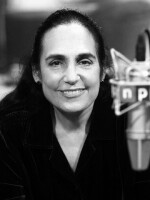STEVE INSKEEP, host:
The same debate that many Americans have over gay rights preoccupies many Jewish Americans. Orthodox Judaism is clear on homosexual relations. They are wrong, based on the Bible. Reform Judaism, the largest branch in America, and the reconstructions - a smaller branch - both allow gay rabbis and cantors. Conservative Jews are in the middle wrestling with this issue, and like other faith groups, they're struggling to redefine the role of gays within their congregations.
NPR's Margot Adler reports.
MARGOT ADLER: The policy has been in place for more than a decade. In 1992, the Committee on Jewish Law and Standards, a body of 25 conservative rabbis and five nonvoting lay people, approved a position that banned gays from attending Jewish theological seminaries and becoming rabbis or cantors. It also took a position against same-sex marriage and homosexual relationships. These policies were not uniformly enforced.
Now, change is in the air at. A meeting going on now in New York, five papers, or teshuvot, have been presented.
Rabbi JOEL MEYERS (Executive Vice President, Rabbinical Assembly): Three papers are advocating change in halakhah and Jewish law, and two are advocating status quo.
ADLER: Rabbi Joel Meyers is the executive vice president of the Rabbinical Assembly, the association of conservative rabbis. The meeting is private and closed. The papers are not public. And most people are saying that more than one position will be approved. As Rabbi Meyers put it...
Rabbi MEYERS: Everybody is speculating there will be two opinions on the table. I've been reading that myself, and it's very possible.
ADLER: In fact, since it takes six votes out of 25 to approve a position, papers supporting change and supporting the status quo could both be approved, something which happened when the conservative movement allowed the ordination of women.
There's an old saying, two Jews, three opinions. Rabbi Meyers says this tradition of halakhic pluralism is not unusual.
Rabbi MEYERS: So if they confront two decisions that are opposite one another, it will not be unique within the movement even if it sounds unique to the public.
ADLER: The Committee on Jewish Law and Standards only makes recommendations, but it signals where conservative Judaism stands in the struggle between being more inclusive and adhering to tradition.
As a practical matter, even if there is a vote to allow the ordination of gays, it will be up to each seminary to choose whether to change policy. The Jewish Theological Seminary in New York, for example, would have to vote on the issue.
Elizabeth Richmond(ph) is a third-year student at the seminary. She says there are students ready to apply if a change occurs.
Ms. ELIZABETH RICHMOND (Student, Jewish Theological Seminary): In fact, I spoke yesterday with a college senior in St. Louis; he has his application ready. And as soon as the decision is made and hopefully the policy changes, he's ready to apply.
ADLER: Richmond is a member of Keshet, a group that advocates for social and religious equality for Jews of all sexual orientations. She says Jewish law has never stood still, but has always evolved and that the conservative movement must accept gays and lesbians as equals.
Ms. RICHMOND: Because it's the right thing to do. It's the Jewish thing to do. It's the just thing to do.
ADLER: Rabbi David Lincoln, however, the senior rabbi at the Park Avenue Synagogue in New York, supports the status quo and says a change would be an extreme break with tradition.
Rabbi DAVID LINCOLN (Senior Rabbi, Park Avenue Synagogue): After all, in the Bible the homosexual behavior is forbidden. I wouldn't discriminate against any members of the congregation who might be homosexuals, but I'm not sure that we should have them as rabbis and as spiritual leaders because family life is so very important in our Jewish tradition.
ADLER: Many predict that a paper written by Rabbi Joel Roth arguing for the status quo will pass. Another paper that may pass by Rabbi Elliot Dorff would support gay ordination and gay unions but continue to say that anal sex is incompatible with Jewish law.
It is also possible that at least one of the papers could be deemed a takanah, a radical departure needing 13, not six, votes to pass.
Rabbi Joanna Samuels leads Congregation Habonim in Manhattan. She says it's just like when the conservative movement decided to ordain women.
Rabbi JOANNA SAMUELS (Rabbi, Congregation Habonim): You're going to have people who feel great about it. You're going to have people who feel like it's not their issue. And then you'll have a small minority of people who are very troubled by it.
ADLER: Votes are expected later today, but not guaranteed.
Margot Adler, NPR News, New York. Transcript provided by NPR, Copyright NPR.






